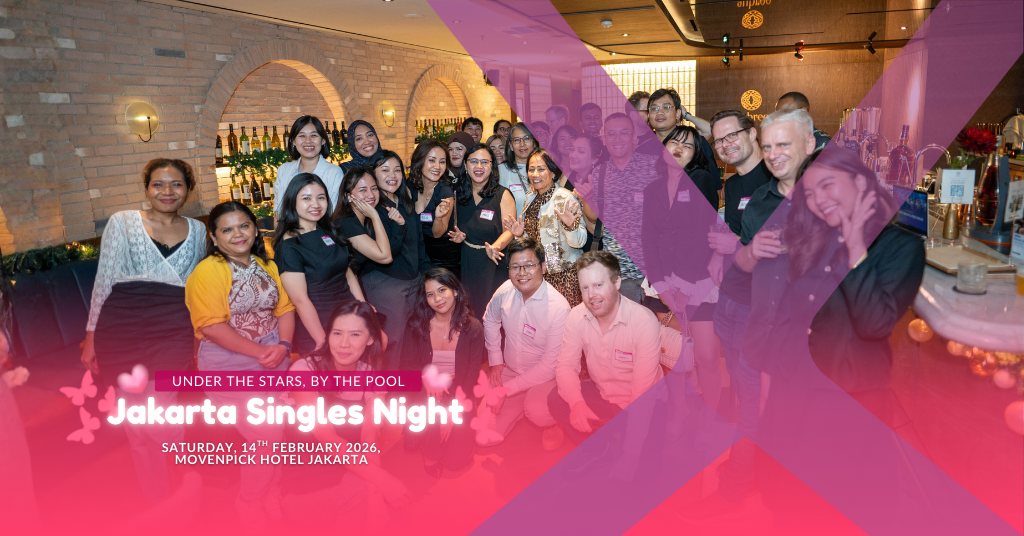Bali is well-known for its beautiful beaches, lush landscapes, and cultural attractions, but it also has a thriving shopping scene. While many visitors flock to popular malls and designer boutiques, budget shoppers can find great deals and one-of-a-kind souvenirs at local markets.
Bali has a wealth of hidden gems for savvy shoppers, from bustling bazaars to traditional village markets. This article will take you on a journey through the colourful world of Bali market shopping, revealing the best local markets to visit for budget shoppers.
Criteria for choosing the best markets in Bali
When looking for the best local markets in Bali, several criteria can help you choose the best ones. Here are some examples of the criteria:
Affordability
Affordability is an important consideration. The best local markets in Bali provide a diverse selection of goods at reasonable prices. These markets allow for bargaining and good deals, ensuring that visitors can find affordable items without sacrificing quality.
Authenticity
Choosing the best markets requires a high level of authenticity. Bali is well-known for its rich cultural heritage and traditional handicrafts. Markets that promote and preserve local arts, crafts, and traditional products are well-regarded. Authentic markets provide a genuine experience by allowing visitors to explore and purchase one-of-a-kind items that reflect local culture and traditions.
Accessibility
Another critical factor is accessibility. Visitors will find the best markets in Bali to be those that are easily accessible. They may be in popular tourist areas or have convenient transportation. Tourists can visit and explore more easily when markets are nearby, which improves their overall experience.
List of the best local markets in Bali
Ubud Market
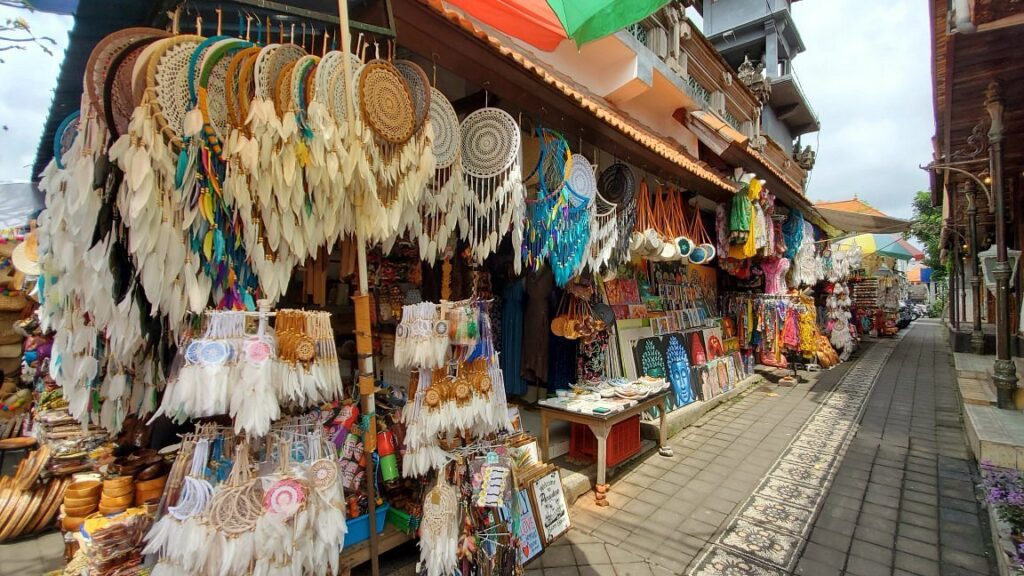
Ubud Market has become a must-visit destination for those looking for a vibrant and culturally immersive shopping experience in Bali, thanks to its unique atmosphere and diverse range of offerings.
Unique features
Ubud Market is notable for its lively and bustling atmosphere, which captures the essence of Bali’s artistic and cultural heritage. It is centrally located in Ubud, a town known for its arts and crafts. With colourful stalls, bustling crowds, and the lively chatter of vendors and visitors, the market is a hive of activity. Its distinct appeal stems from the fusion of traditional and modern elements, which results in an enchanting shopping experience.
Offered products
Ubud Market is well-known for its wide selection of traditional Balinese handicrafts, artworks, textiles, and souvenirs. Woodcarvings, silver jewellery, batik fabrics, traditional paintings, and intricate Balinese masks are among the many handcrafted items available to visitors. In addition, the market sells a variety of locally sourced spices, herbs, and exotic fruits. It also has a large selection of clothing, accessories, home decor, and other one-of-a-kind items that showcase Bali’s craftsmanship and artistic flair.
Sukawati Art Market
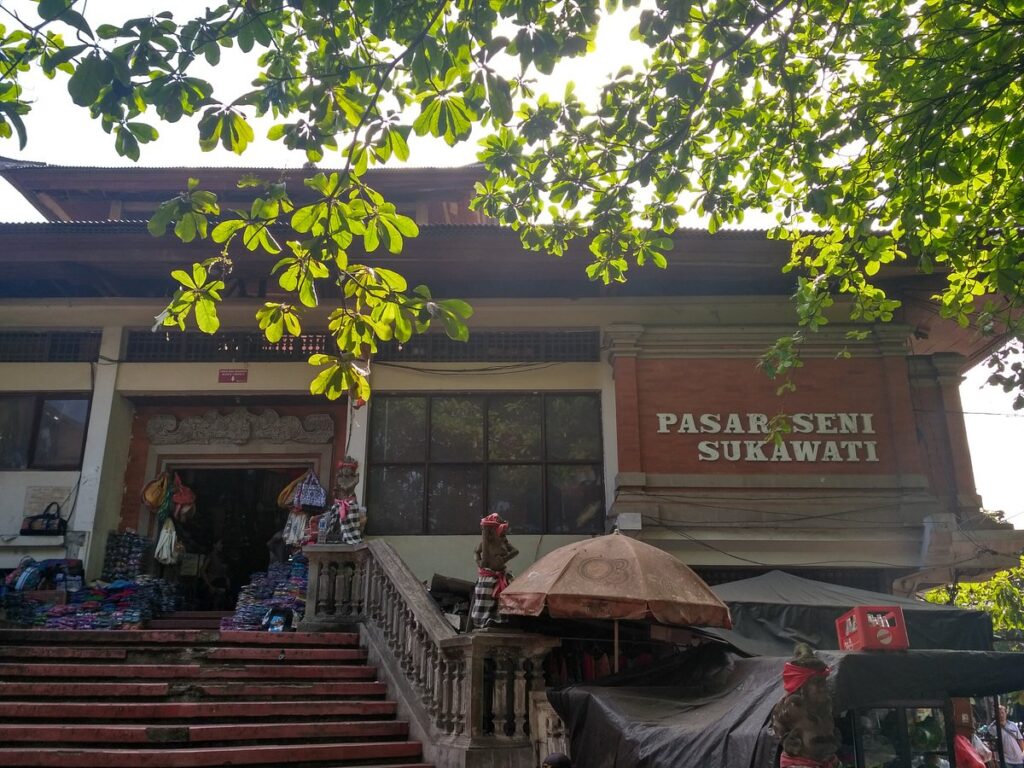
Sukawati Market, with its local charm and emphasis on traditional arts and crafts, offers a more authentic and intimate shopping experience for visitors interested in learning about Balinese culture and purchasing unique, locally made products.
Unique features
The traditional Balinese market atmosphere distinguishes Sukawati Market. Sukawati, unlike some of the larger and more tourist-oriented markets, has a local charm and authenticity that draws visitors seeking an immersive cultural experience. The market has a more relaxed and laid-back vibe, offering a glimpse into the local community’s daily life. It is a bustling market where locals congregate to buy and sell goods, creating a lively and vibrant atmosphere.
Offered products
Traditional Balinese arts and crafts are the focus of Sukawati Market. It is well-known for its extensive collection of handcrafted items, which includes intricate wood carvings, colourful paintings, intricately designed batik fabrics, traditional masks, and one-of-a-kind sculptures. Traditional Balinese clothing, accessories, jewellery, and home decor items are also available to visitors. The market allows visitors to explore and purchase genuine Balinese handicrafts at reasonable prices, making it a popular destination for both art enthusiasts and souvenir shoppers.
Kuta Art Market
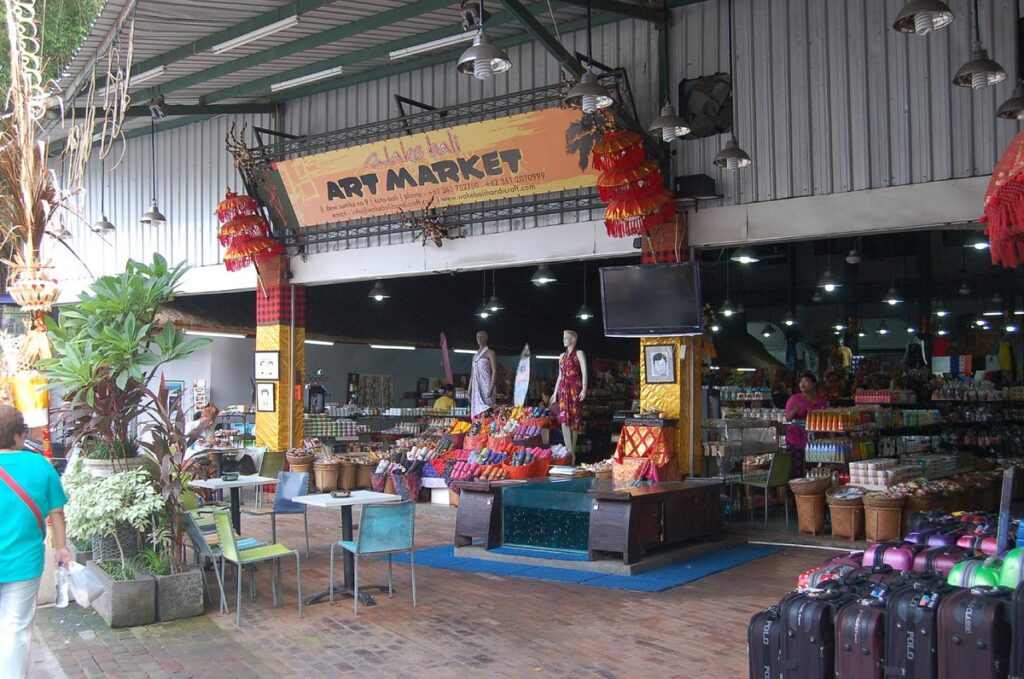
Kuta Art Market appeals to both local and international visitors looking for a lively shopping experience, thanks to its vibrant atmosphere and diverse range of products. It is a place where traditional Balinese craftsmanship meets modern tourism demands, allowing visitors to explore and purchase a diverse range of artistic and cultural treasures.
Unique features
Kuta Art Market is a well-known tourist attraction known for its lively and vibrant atmosphere. The market, located in the heart of Kuta, Bali’s bustling beach resort area, offers a unique blend of traditional Balinese culture and modern tourism. Its proximity to Kuta Beach is one of its distinguishing features, making it a convenient shopping destination for beachgoers. The vibrant ambience of the market, filled with colourful stalls, street vendors, and the sounds of bargaining, creates an energetic and bustling atmosphere.
Offered products
Kuta Art Market is well-known for its diverse product selection, which caters to a wide range of tastes and preferences. Handicrafts ranging from traditional Balinese art to contemporary crafts are available to visitors. The market is well-known for its batik fabrics, sarongs, and clothing, which combine traditional and modern designs.
Shoppers can also look through a variety of accessories, such as jewellery, bags, and sandals. The market also sells souvenirs such as keychains, magnets, and trinkets, allowing visitors to bring a piece of Bali’s culture and artistry home with them.
Sanur Night Market
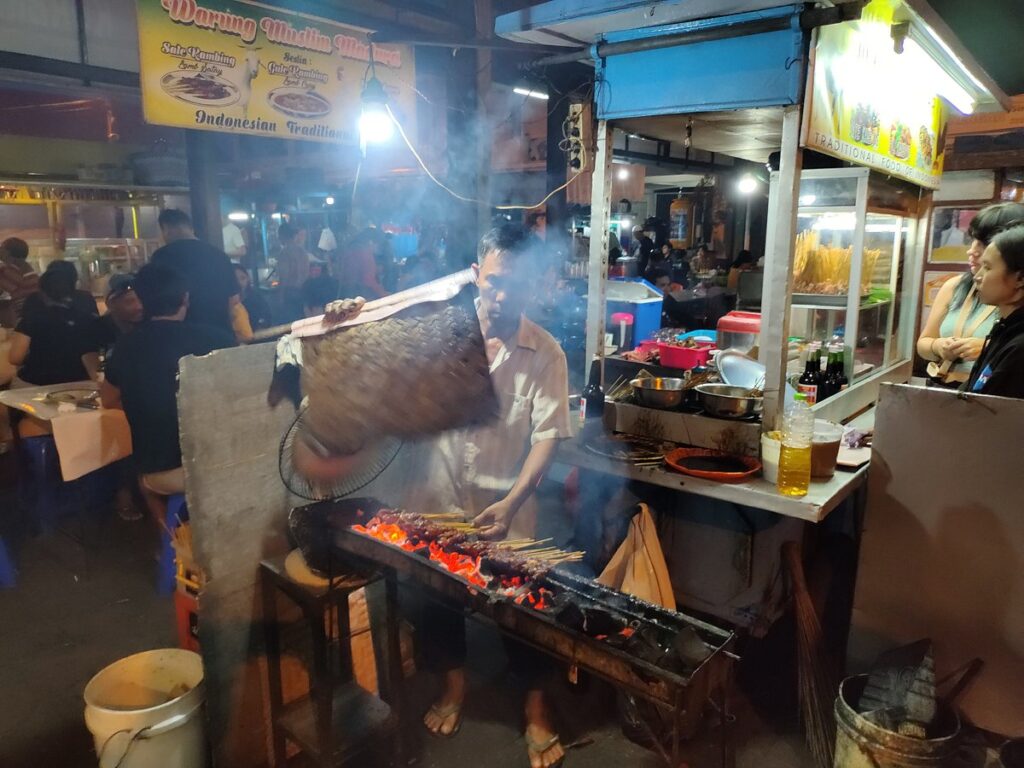
While Sanur Night Market does not offer a wide variety of non-food items such as traditional arts and crafts, its unique focus on local street food and the vibrant night-time atmosphere make it a popular destination for food enthusiasts and those seeking an authentic culinary experience in Bali.
Unique features
Sanur Night Market is notable for its vibrant and lively atmosphere that comes to life after the sun goes down. It operates primarily during the evening hours, as the name implies, and provides visitors with a unique experience. With rows of food stalls, colourful lights, and the aroma of delicious street food wafting through the air, the market exudes a bustling atmosphere. Sanur Night Market allows visitors to immerse themselves in local food culture and enjoy an evening of culinary delights.
Offered products
Sanur Night Market is primarily concerned with food, particularly Indonesian and Balinese cuisine. The market offers a wide range of street food options that highlight Bali’s flavours and culinary traditions. Satay skewers, grilled seafood, traditional Indonesian curries, noodle dishes, and refreshing tropical fruits are among the dishes available to visitors. The market is also known for its low prices, making it an excellent choice for those looking for authentic local cuisine on a budget.
Badung Market
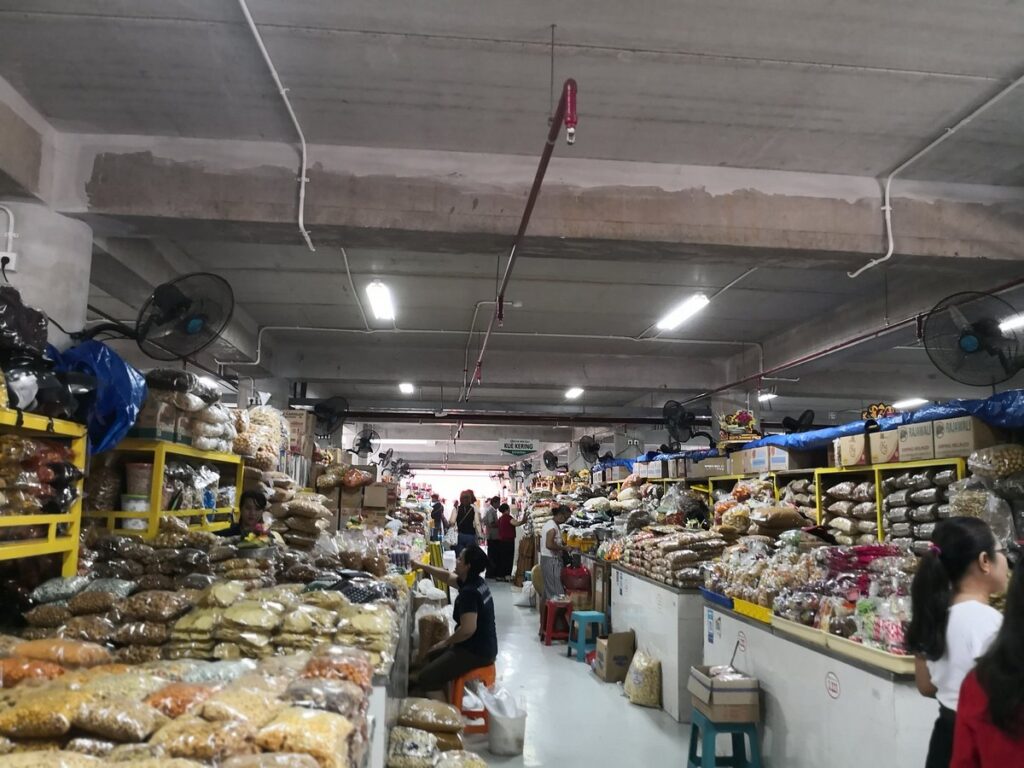
Badung Market, with its sprawling size and diverse range of products, serves as a one-stop destination for both locals and visitors. It provides an immersive experience into Balinese daily life, with sights, sounds, and aromas combined to create a vibrant marketplace that highlights Bali’s rich cultural heritage and commercial vitality.
Unique features
Badung Market is one of Bali’s biggest and busiest traditional markets. It is located in the heart of Denpasar, Bali’s capital city, and serves as a bustling centre of commerce and cultural exchange. Its sprawling size, occupying multiple buildings and sections, is one of its most notable features. The market is a lively and chaotic place, with a constant flow of locals and tourists buying and selling. Its lively atmosphere and genuine local charm make it an exciting place to visit.
Offered products
Badung Market provides a diverse range of products to meet a variety of needs and preferences. It is a large market where visitors can purchase fresh produce, spices, meat, and seafood. Local vendors sell a variety of tropical fruits, vegetables, and herbs, allowing visitors to sample the flavours of Bali’s culinary delights. Badung Market is also well-known for its textiles, clothing, accessories, and household goods. Visitors can shop for fabrics, traditional Balinese clothing, handicrafts, batik prints, and everyday items.
Additional tips for budget shoppers in Bali
Getting the best deals
Before making a purchase, compare prices and explore multiple markets to maximise your budget. Prices for similar items may vary between markets. Additionally, keep an eye out for special discounts or promotions, particularly during the holiday season or at the end of the day when vendors may be more willing to bargain.
Bargaining tips in local markets Bali
Bargaining is expected in Bali markets, and it’s a necessary skill for budget shoppers. Begin by making a lower offer than the initial asking price, and be prepared for counteroffers. Polite and friendly bargaining can frequently result in significant savings. Maintain a respectful and positive attitude throughout the bargaining process.
Best time to shop
Early mornings are ideal for shopping because some vendors may offer fresher produce or better deals to jumpstart their sales. Another tip is to shop during the week, as weekends are busier with more tourists, potentially resulting in higher prices. Consider visiting markets during the shoulder seasons, when there are fewer tourists, which may result in better bargaining opportunities.
Choosing the right transport
Choosing the right mode of transport can have an impact on both your shopping experience and your budget. Public transportation, such as buses or shared taxis, is generally less expensive but has fewer routes. If you’re comfortable riding, renting a scooter or motorbike can provide flexibility and cost-effectiveness. However, remember to prioritise safety and follow local traffic laws.
Looking for more shoestring budget trip guides in Indonesia from Social Expat? Check out these articles as well:






























